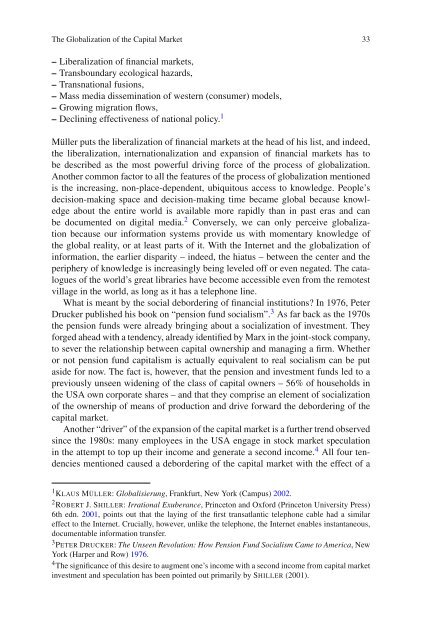The Ethics of Banking: Conclusions from the Financial Crisis (Issues ...
The Ethics of Banking: Conclusions from the Financial Crisis (Issues ...
The Ethics of Banking: Conclusions from the Financial Crisis (Issues ...
You also want an ePaper? Increase the reach of your titles
YUMPU automatically turns print PDFs into web optimized ePapers that Google loves.
<strong>The</strong> Globalization <strong>of</strong> <strong>the</strong> Capital Market 33<br />
– Liberalization <strong>of</strong> financial markets,<br />
– Transboundary ecological hazards,<br />
– Transnational fusions,<br />
– Mass media dissemination <strong>of</strong> western (consumer) models,<br />
– Growing migration flows,<br />
– Declining effectiveness <strong>of</strong> national policy. 1<br />
Müller puts <strong>the</strong> liberalization <strong>of</strong> financial markets at <strong>the</strong> head <strong>of</strong> his list, and indeed,<br />
<strong>the</strong> liberalization, internationalization and expansion <strong>of</strong> financial markets has to<br />
be described as <strong>the</strong> most powerful driving force <strong>of</strong> <strong>the</strong> process <strong>of</strong> globalization.<br />
Ano<strong>the</strong>r common factor to all <strong>the</strong> features <strong>of</strong> <strong>the</strong> process <strong>of</strong> globalization mentioned<br />
is <strong>the</strong> increasing, non-place-dependent, ubiquitous access to knowledge. People’s<br />
decision-making space and decision-making time became global because knowledge<br />
about <strong>the</strong> entire world is available more rapidly than in past eras and can<br />
be documented on digital media. 2 Conversely, we can only perceive globalization<br />
because our information systems provide us with momentary knowledge <strong>of</strong><br />
<strong>the</strong> global reality, or at least parts <strong>of</strong> it. With <strong>the</strong> Internet and <strong>the</strong> globalization <strong>of</strong><br />
information, <strong>the</strong> earlier disparity – indeed, <strong>the</strong> hiatus – between <strong>the</strong> center and <strong>the</strong><br />
periphery <strong>of</strong> knowledge is increasingly being leveled <strong>of</strong>f or even negated. <strong>The</strong> catalogues<br />
<strong>of</strong> <strong>the</strong> world’s great libraries have become accessible even <strong>from</strong> <strong>the</strong> remotest<br />
village in <strong>the</strong> world, as long as it has a telephone line.<br />
What is meant by <strong>the</strong> social debordering <strong>of</strong> financial institutions? In 1976, Peter<br />
Drucker published his book on “pension fund socialism”. 3 As far back as <strong>the</strong> 1970s<br />
<strong>the</strong> pension funds were already bringing about a socialization <strong>of</strong> investment. <strong>The</strong>y<br />
forged ahead with a tendency, already identified by Marx in <strong>the</strong> joint-stock company,<br />
to sever <strong>the</strong> relationship between capital ownership and managing a firm. Whe<strong>the</strong>r<br />
or not pension fund capitalism is actually equivalent to real socialism can be put<br />
aside for now. <strong>The</strong> fact is, however, that <strong>the</strong> pension and investment funds led to a<br />
previously unseen widening <strong>of</strong> <strong>the</strong> class <strong>of</strong> capital owners – 56% <strong>of</strong> households in<br />
<strong>the</strong> USA own corporate shares – and that <strong>the</strong>y comprise an element <strong>of</strong> socialization<br />
<strong>of</strong> <strong>the</strong> ownership <strong>of</strong> means <strong>of</strong> production and drive forward <strong>the</strong> debordering <strong>of</strong> <strong>the</strong><br />
capital market.<br />
Ano<strong>the</strong>r “driver” <strong>of</strong> <strong>the</strong> expansion <strong>of</strong> <strong>the</strong> capital market is a fur<strong>the</strong>r trend observed<br />
since <strong>the</strong> 1980s: many employees in <strong>the</strong> USA engage in stock market speculation<br />
in <strong>the</strong> attempt to top up <strong>the</strong>ir income and generate a second income. 4 All four tendencies<br />
mentioned caused a debordering <strong>of</strong> <strong>the</strong> capital market with <strong>the</strong> effect <strong>of</strong> a<br />
1 KLAUS MÜLLER: Globalisierung, Frankfurt, New York (Campus) 2002.<br />
2 ROBERT J. SHILLER: Irrational Exuberance, Princeton and Oxford (Princeton University Press)<br />
6th edn. 2001, points out that <strong>the</strong> laying <strong>of</strong> <strong>the</strong> first transatlantic telephone cable had a similar<br />
effect to <strong>the</strong> Internet. Crucially, however, unlike <strong>the</strong> telephone, <strong>the</strong> Internet enables instantaneous,<br />
documentable information transfer.<br />
3 PETER DRUCKER: <strong>The</strong> Unseen Revolution: How Pension Fund Socialism Came to America,New<br />
York (Harper and Row) 1976.<br />
4 <strong>The</strong> significance <strong>of</strong> this desire to augment one’s income with a second income <strong>from</strong> capital market<br />
investment and speculation has been pointed out primarily by SHILLER (2001).

















